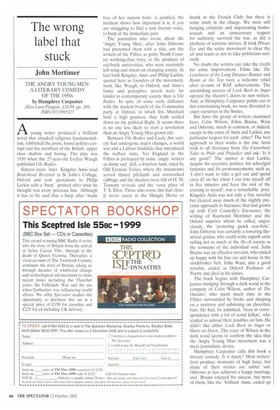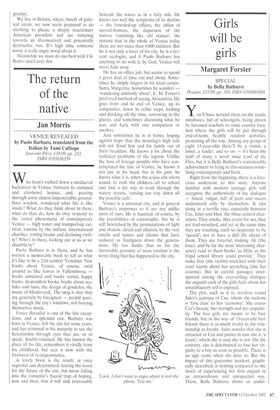The wrong label that stuck
John Mortimer
THE ANGRY YOUNG MEN: A LITERARY COMEDY OF THE 1950s by Humphrey Carpenter Allen Lane/Penguin, £18.99, pp. 209, ISBN 0713995327 Ayoung writer produced a brilliant novel that attacked religious fundamentalism, rubbished the press, found politics corrupt and the members of the British upper class shallow and boring. The date was 1930 when the 27-year-old Evelyn Waugh published Vile Bodies.
Sixteen years later Kingsley Amis read Brideshead Revisited at St John's College, Oxford and sent quotations to Philip Larkin with a 'burp' printed after what he thought was every precious line. Although it has to be said that a burp after 'made free of her narrow loins' is justified, the incident shows how important it is, if you are struggling to find a new literary voice, to burp at the immediate past.
The journalists who wrote about the 'Angry Young Men', after John Osborne had presented them with a title, saw the writers of the Fifties as gritty North Country working-class boys, or the products of red-brick universities, who were resolutely left-wing and intent on changing society. In fact both Kingsley Amis and Philip Larkin, quoted here as founders of the movement, went, like Waugh, to Oxford. and Amiss funny and perceptive novels were far kinder to contemporary society than is Vile Bodies. In spite of some early dalliance with the student branch of the Communist party at Oxford, in which Iris Murdoch held a high position, they both settled down on the political Right. It seems there is no one less likely to start a revolution than an Angry Young Man grown old.
Between Vile Bodies and Lucky Jim society had undergone major changes, a world war and a Labour landslide that introduced the welfare state. Yet England in the Fifties is portrayed by some 'angry' writers as damp and dull, a wineless land, ruled by Old Etonian Tories, where the restaurants served tinned pilchards and overcooked cabbage and the theatres were full of H. M. Tennant revivals and the verse plays of T. S. Eliot. Those who wrote this had clearly never eaten in the Hungry Horse or drunk in the French Club; but there is some truth in the charge. We were still hanging criminals and imprisoning homosexuals and an unnecessary respect for authority survived the war, as did a plethora of wartime movies. It took Private Eye and the satire movement to clear the air and teach us not to take politicians seriously.
No doubt the writers can take the credit for some improvement. Films like The Loneliness of the Long Distance Runner and Room at the Top were a welcome relief after re-runs of RAF achievements. The astonishing success of Look Back in Anger opened the theatre's doors to new writers. And, as Humphrey Carpenter points out in this entertaining book, we were liberated to enjoy ourselves in the Sixties.
But have the group of writers examined here, Colin Wilson, Johns Braine, Wain and Osborne, much in common, or indeed, except in the cases of Amis and Larkin, any particular respect for each other? The best approach to their works is the one Amis took to all literature from The Canterbury Tales to Pride and Prejudice and ask, 'Is it any good?' The answer is that Larkin, despite his eccentric politics, his schoolgirl fantasies and his pronouncements, such as, 'I don't want to take a girl out and spend circa /5 on her when I can toss myself off in five minutes and have the rest of the evening to myself', was a remarkable poet. Kingsley Amis was not only a fine novelist but cleared away much of the slightly precious approach to literature that had grown up with Cyril Connolly's Encounter, the writing of Raymond Mortimer and the Oxford superior whom he called, ungraciously, the 'posturing quack cess-hole'. John Osborne was certainly a towering theatrical genius, who could write superb arias railing not so much at the ills of society as the torments of the individual soul. John Braine was an effective novelist, who ended up happy with his fine car and house in the stockbroker belt. John Wain, also a good novelist, ended as Oxford Professor of Poetry and died in his sixties.
The book begins with Humphrey Carpenter trudging through a dark wood in the company of Colin Wilson, author of The Outsider, who spent much time in the Fifties surrounded by books and sleeping on a mattress and subsisting on chocolate bars. He had, he admitted, 'been in correspondence with a lot of serial killers', who tended to unload their troubles on him. He didn't like either Look Back in Anger or Hurry on Down. The voice of Wilson in the dark wood seems to confirm the idea that the Angry Young Man movement was a mere journalistic device.
Humphrey Carpenter calls this book a literary comedy. Is it funny? Most writers' lives produce moments of high farce, but many of their stories are rather sad. Osborne at last achieved a happy marriage and Braine enjoyed his success, but most of them, like the brilliant Amis, ended up grumpy.
We live in Britain, where, bereft of political ideals, we now seem prepared to do anything to please a deeply reactionary American president and are tottering towards an ill-conceived and potentially destructive war. It's high time someone wrote a really angry novel about it.
Meanwhile we must do our best with Vile Bodies and Lucky Jim.



































































































 Previous page
Previous page